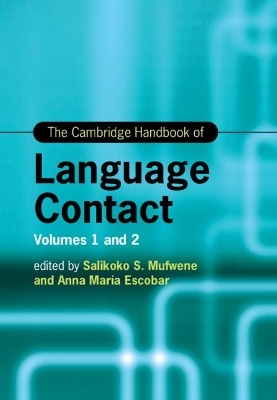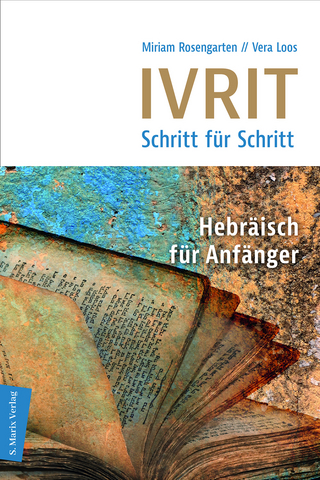
The Cambridge Handbook of Language Contact 2 Volume Hardback Set
Cambridge University Press
978-1-107-17487-0 (ISBN)
Language contact - the linguistic and social outcomes of two or more languages coming into contact with each other - has been pervasive in human history. Whether or not we are aware of it, we as humans always deal with language contact. Bringing together contributions from an international team of scholars, this two-volume Handbook represents the state-of-the-art in the field of language contact. The first volume focuses on population movement and language change, and the second volume looks at multilingualism and population structure. Each of the two volumes start with an introduction outlining the history of the research in the field. They are then organised into thematic parts, and cover the processes, theoretical issues and outcomes involved in a range of language contact situations worldwide. Easy-to-read yet wide-ranging in scope, the Handbook is essential reading for anybody interested in how people behave linguistically in multilingual or multilectal settings.
Salikoko S. Mufwene is the Edward Carson Waller Distinguished Service Professor of Linguistics at the University of Chicago. His current research is on the phylogenetic emergence and speciation of languages, and on language vitality. His books include The Ecology of Language Evolution (CUP, 2001), Iberian Imperialism and Language Evolution in Latin America (U of Chicago Press, 2014), and Bridging Linguistics and Economics (CUP, 2020). He is the founding editor of Cambridge Approaches to Language Contact. Anna María Escobar is Professor Emerita at the University of Illinois at Urbana-Champaign. Through the study of grammatical change, her work focuses on the emergence of contact-induced linguistic outcomes and minoritized Spanish varieties. Her long-term project focuses on the making of Andean Spanish, with colonial and post-colonial corpora.
List of contributors; List of figures; List of tables; Preface; Introduction: 1. Introduction: language contact in population structure; Part I. Multilingualism: 2. Societal Multilingualism; 3. Individual bilingualism; 4. Codeswitching and translanguaging; 5. Urban contact dialects; 6. Multilingualism and super-diversity: some historical and contrastive perspectives; 7. Multilingualism and language contact in signing communities; 8. Multilingualism in India, Southeast Asia, and China; 9. Monolingualism vs. multilingualism in Western Europe: language regimes in France, Spain, and the United Kingdom; Part II. Contact, Emergence, and Language Classification: 10. Perspectives on creole formation; 11. Non-European pidgins in early European colonial explorations and trade: mobilian jargon and maritime Polynesian pidgin in contrast; 12. Mixed languages; 13. Reconstructing the sociolinguistic history of expansion languages in the Americas: a research program; 14. On the idiolectal nature of lexical and phonological contact: spaniards, nahuas, and Yoruba in the new world; Part III. Lingua Francas: 15. The emergence of lingua Francas; 16. Colonization and the emergence and spread of indigenous lingua francas in Africa, the Americas and Asia; Part IV. Language Vitality: 17. Language endangerment, loss, and reclamation today; 18. Contact and shift: colonization and urbanization in the Arctic; 19. The Indian diaspora: language maintenance and loss; 20. Quechua expansion during the Inca and colonial periods; 21. Indigenous and immigrant languages in the US: language contact, change and survival; Part V. Contact and Language Structures: 22. Structural outcomes of language contact; 23. The emergence of Andean Spanish: against the odds; 24. Contact between English and Norman in the Channel Islands; Author index; Subject index. List of contributors; List of figures; List of tables; Preface; Introduction; 1. Language contact: what a rich and intellectually stimulating history since the late 19th century!; Part I. Language Contact and Genetic Linguistics: 2. Language contact and historical linguistics; 3. The chinese expansion and language coexistence in modern China; 4. Tracing language contact in Africa's past; 5. Populations in contact: linguistic, archaeological, and genomic evidence for indo-european diffusion; 6. The impact of autochthonous languages on bantu language variation: a comparative view on southern and central Africa; Part II. Linguistic Areas: 7. The Balkans; 8. The amazon basin: linguistic areas and language contact; 9. Migration and trade as drivers of language spread and contact in indigenous Latin America; 10. Language contact in South Asia; Part III. Language Spread: 11. The geographic and demographic expansion of Malay; 12. Geographic and demographic spread of Swahili; 13. Arabic language contact; Part IV. Emergence and Spread of Some European Languages: 14. The emergence and evolution of romance languages in Europe and the Americas; 15. The expansion and evolution of Portuguese; 16. French and English in contact in North America; 17. French in African contact settings; 18. The geographical and demographic expansion of English; Part V. Language Diasporas: 19. Diasporas: an overview; 20. Labor migrations: language change in communities and Diasporas; 21. The Korean diaspora; 22. The Chinese diaspora: language maintenance and loss; 23. The diachrony of Yiddish and judaeo-spanish as contact languages; Author index; Subject index.
| Erscheint lt. Verlag | 30.6.2022 |
|---|---|
| Reihe/Serie | Cambridge Handbooks in Language and Linguistics |
| Verlagsort | Cambridge |
| Sprache | englisch |
| Maße | 174 x 250 mm |
| Gewicht | 2700 g |
| Themenwelt | Geisteswissenschaften ► Sprach- / Literaturwissenschaft ► Sprachwissenschaft |
| ISBN-10 | 1-107-17487-2 / 1107174872 |
| ISBN-13 | 978-1-107-17487-0 / 9781107174870 |
| Zustand | Neuware |
| Informationen gemäß Produktsicherheitsverordnung (GPSR) | |
| Haben Sie eine Frage zum Produkt? |
aus dem Bereich


